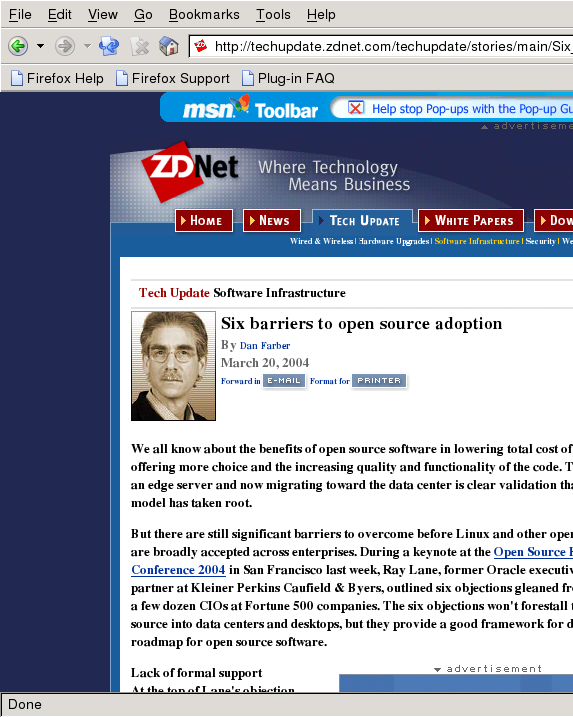Support issues around open source
by Sebastian Rahtz on 1 June 2004
Introduction
Support issues around open source Sebastian Rahtz, Manager, JISC Open Source Software Advisory Service June 2004
The common perception about Open Source and support
Ray Lane, former Oracle executive, cites 6 problems with open source:
- Informal support
- Velocity of change
- No roadmap
- Functional gaps
- Licensing caveats
- ISV endorsements (ZD Net March 2004 http://techupdate.zdnet.com/techupdate/stories/main/Six_barriers_to_open_source_adoption.html
Does ZD Net worry us?

…in more detail
“The free license for an open source package is just a fraction of the cost to deploy and maintain an application. The support infrastructure and assurance is less defined, and enterprises must proceed at their own risk. In many cases, an enterprise can rely on the open source community for more informal support, which won’t be sufficient for mission-critical applications.”
How can we get that support?
We can
- make a virtue of Velocity of change
- celebrate No roadmap
- plug Functional gaps
- make light of Licensing caveats
- stand aloof from ISV endorsements but can we ignore the issue of support?
…or are they all about support
We can
- Velocity of change: who supports change?
- No roadmap: how do we plan support needs?
- Functional gaps: will we need support to plug them?
- Licensing caveats: does this impact on who can provide support?
- ISV endorsements: will anyone admit to being able to help us?
What did the OSS Watch scoping study find?
- Only 3% of respondents chose open source because of the support
- 37% (41% in FE colleges) cite 3rd party support as a major concern (though interoperability was a higher concern)
- In one department, there was no explicit strategy, but IT support was offered only for a limited number of systems, effectively creating a de facto strategy very little awareness of the range of support models
aargh

Breaking down support
Who will support our software?
- Who helps us install it?
- Who do we call when it dies?
- How do we fix misfeatures?
- Where do we get documentation?
- Who trains our staff?
- Who trains our users? Not many of these come from the software supplier
Support suppliers
Ask yourself where you obtained support in each of these areas the last time you deployed a:
- Web server
- Student records system
- Desktop office suite
- VLE
- Email client
- Image editing program
Installation
- Web server
- You followed online instructions
- Student records system
- The consultant or project team did it
- Desktop office suite
- It was already there with the OS
- VLE
- The supplier, consultant or project team did it
- Email client
- Your desktop support people did it
- Image editing
- You followed the instructions
Death
- Web server
- You call the sysadmin
- Student records system
- You call the consultant
- Desktop office suite
- You shrug your shoulders, reboot, and pray
- VLE
- You call the consultant
- Email client
- You swear, reboot, and install an upgrade from the web
- Image editing
- You ring up and complain. You are told to wait for version 8.6
Fixes
- Web server
- You are too scared to consider it
- Student records system
- You pay the consultant another £1 million
- Desktop office suite
- You can’t fix it
- VLE
- You call a meeting of the project team
- Email client
- You upgrade
- Image editing
- You wait for the next version
Documentation
- Web server
- Buy an O’Reilly book
- Student records system
- There is no documentation
- Desktop office suite
- Buy a book in Borders
- VLE
- It’s online in the system
- Email client
- Who needs documentation?
- Image editing
- You buy a book. You lent the manual to someone else
Training
- Web server
- If the sysadmin doesn’t understand it, send him on a course
- Student records system
- You paid through the nose for this already
- Desktop office suite
- Enroll people on the ECDL
- VLE
- Poke it and see
- Email client
- If they need training, they can’t use email
- Image editing
- You have internal courses on this
User Help
- Web server
- They don’t know it exists
- Student records system
- The project team have a phone
- Desktop office suite
- Your help desk people do it every day
- VLE
- Ask on a forum
- Email client
- Your help desk does this 99% of the day
- Image editing
- They ask their geek friends
Which of those was open source?
- Web server: Apache, open source
- Student records: Oracle, commercial
- Office suite: Microsoft, commercial
- VLE: Moodle, open source
- Email client: Outlook Express, commercial
- Image editing: Photoshop, commercial If we replaced Microsoft Office with Open Office, Outlook with Mozilla Thunderbird, Photoshop with the GIMP, and Moodle with Blackboard, how much would change?
So what does the commercial licence buy you?
- revenue to pay for development of new versions
- writing documentation
- direct support of user in niche markets
- advertising to make sure this product is widely used
- upholding the capitalist system by paying dividends on stock
Key sources of support for all your software
- The person at the next desk
- Your staff. You pay them to understand this stuff
- The web. Self-help is the name of the game
- The bookshop. Any software worth using has a shelf-full of books about it
- Training courses. Lots of companies offer training
- Consultants. Pay a man in a suit to come in and fix things
- The people who wrote the software
The goal

(photo copyright Brian Wilson)
Do it yourself?

(picture copyright Matilde Rahtz)
How do you justify that?
- You control exactly what happens, and see just how money is spent
- Your staff become experts, and you can re-use their skills
- You can offer consultancy to others
- You control the help, documentation and training
Join a consortium

(photo copyright Brian Wilson)
How does that work?
You partner with institutions doing the same sort of work, and share resources to solve common problems. Some contribute code, others documentation, others training.
Examples: Bodington (VLE): http://www.bodington.org/; SAKAI: http://www.sakaiproject.org/ (producing open source Collaboration and Learning Environment software); uPortal (portal framework): http://www.uportal.org/
Employ a specialist consultant

(photo copyright Sebastian Rahtz)
How do they make a living?
- The usual way: training, system support, specialist addons
- As part of their work for you, they contribute to open source efforts and open standards; this makes them saleable
- Writing bespoke code is always a well-paid occupation
- It does not matter whether they support open or closed source
Stick with your existing vendors

(photo copyright Sebastian Rahtz)
Such as?
Some of the biggest players will develop systems based on open source for you:
- IBM support Linux on their hardware, and a lot of open source web-services software (which they contribute to)
- Apple have an open source operating system under Mac OSX, which they support
- Novell have based their future on Linux server and desktop support
- Sun will deploy open source-based desktops and office suites, and work on open source educational software: http://community.java.net/edu-jelc/ and https://edu-jelc.dev.java.net
The truth
There is no silver bullet.
- support for open source is as variable as it is for proprietary software
- you’ll pay for training whatever happens
- much depends on the existing knowledge of your staff and students
- all large software deployments need support
- the availability of source code sometimes makes it easier to shop around
- open source has support ranging from geek teenagers to IBM, with a lot in between


